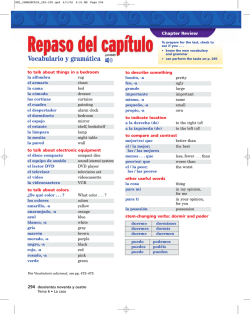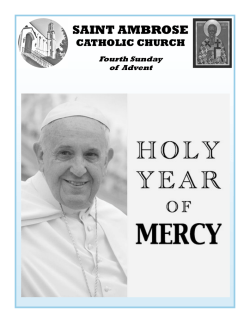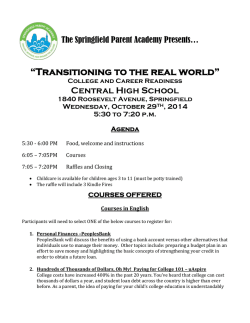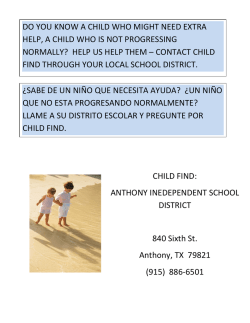
JanuaryFebruary 2015
2/25/2015 FebruaryMarch Newsletter Subscribe Share Past Issues Translate View this email in your browser JanuaryFebruary 2015 Connect with us through the following channels Facebook Website Twitter Slideshare Recent Events 20 January 2015 – ROER4D network team planning day... read more. 15 January 2015 – Online session with DECI2 team for a ROER4D evaluation update... read more. 27 November 2014 – Online session with DECI2 team for an update on Research Communications ... read more. Welcome to the January/February edition of the ROER4D Newsletter. The first newsletter of 2015 features a comprehensive roundup of news and updates from the various subprojects as well as a feature about PI Cheryl HodgkinsonWilliams’ recent trip to the World Bank Regional Consultation Conference in Nairobi, Kenya. We are also preparing to welcome 7 new projects into the ROER4D family. The ROER4D Impact Studies team at Wawasan Open University are concluding the final contracting and logistical work required to formalise the award of research grants to conduct impact studies into the impact of OER in Africa and Asia. We are delighted that the new grantees will be participating in the ROER4D workshop in Banff, Canada on 2021 April 2015, as well as attending the OEC Global Conference 2224 April. Details of the grantees and their projects will be available on the ROER4D website shortly. We wish all members of the network and the Open Education community a happy Open Education Week (9 13 March). Please let us know what you are doing to mark this event by connecting with us on our social channels: @roer4D on Twitter and via Facebook. Forthcoming Events Recent Blog Posts The next ROER4D workshop will be meeting on 20 and 21 April 2015 in Banff, Alberta, Canada. The workshop will precede the Open Education Consortium (OEC) Conference (2224 April 2015) and we are delighted to have been granted a specialist research track at the http://us9.campaignarchive2.com/?u=9d07383ef349953874b75ebbe&id=286ab07669&e= 1/11 2/25/2015 FebruaryMarch Newsletter PI Cheryl Hodgkinson Williams attends World Bank’s Regional Consultation Conference in Nairobi (2627 January 2015)... read more. conference. Shared with the GOGN network, the research track will allow ROER4D researchers to present on various aspects of their projects including methodology and initial findings. The 7 OER Impact studies projects will meet other members of the network for the first time. Main feature: Cheryl HodgkinsonWilliams attends World Bank Regional Consultation Conference ROER4D Impact Studies Workshop in Penang, Malaysia (15 December 2014)... read more. SP4 Visit to Hyderabad, India to Observe SP3 Workshop... read more, ROER4D Twitter feed ROER4D 307 followers 841 tweets following 355 people follow Latest Tweets RT @uhernandez: @ROER4D: #OpenResearch required #OpenData, #OpenLicensing and #OpenFormats. These principles guide project Our PI Cheryl HodgkinsonWilliams was invited to the Regional Consultation Conference on the World Bank’s “World Development Report 2016” in Nairobi, Kenya from 2627 January 2015. The World Bank produces an annual report focusing on a particular aspect of development each year. The theme for 2016 is “Internet for Development”. The Report will explore the internet’s impact on economic growth, on social and economic opportunity, and on the efficiency of public service delivery, with a view to help countries better leverage the internet for development. This will involve the identification of policy reforms not only in the information and communication technology sectors but also more broadly in various complementary sectors and in the development community. Cheryl was delighted to meet the Codirectors of the World Development Report (WDR) 2016, Deepak Mishra and Uwe Deichmann, the WDR contributors and particularly the fascinating range of government officials, researchers, business executives, entrepreneurs and consultants from Africa. Cheryl was invited to contribute to a session focussing on Internet and public service delivery. She presented a brief explanation of the value of open educational resources and alternative licensing mechanisms such as Creative Commons to assist creators to share educational content legally. Cheryl highlighted OER initiatives from Africa (e.g. AVU, OER Africa, OpenUCT, AfriVIP, TESSA), some OpenTextbooks (e.g. Siyavula, Electric Book Works) and emerging MOOCs (Medicine and the Arts Humanising Healthcare). While some in the group seemed to know about Creative Commons, the fact that only Cheryl made her presentation freely and openly available online, suggests that the concept of OER has not yet gained sufficient traction to make sharing of publicly influential information a common practice. Nevertheless, Cheryl was pleased that she was able to bring OER, Open textbooks and MOOCs into the Consultation event. Read more about the key focus areas and session http://us9.campaignarchive2.com/?u=9d07383ef349953874b75ebbe&id=286ab07669&e= 2/11 2/25/2015 FebruaryMarch Newsletter #coKREA http://t… 2:46PM Session on data curation strategies facilitated by Thomas King about to start for #ROER4D researchers. Looking forward to sharing ideas. 1:51PM "@Research2Action: MT @DFID_Evidence: What do we know about what policy makers want?! Do academics understand?! http://t.co/BfyTW006DW #AEN" 8:05PM RT @celTatis: #ExplOERer friends need a few more answers for their survey, can you help? http://t.co/8YsJTE8LSJ #OEP #reuse 8:02PM RT @mweller: For her #oer15 keynote @sheilmcn is after input https://t.co/ETsnceq5qP (don't give her too much good stuff, coz mine will loo… 8:01PM proceedings in Cheryl’s comprehensive blog post. OER resources and readings The Network Hub has been developing a shared bibliography of papers on Open Educational Resources, focusing on the Global South. Researchers who are interested in using this bibliography in their own research can view it here. Comments for additional papers are very welcome, as this is a growing resource that we intend to keep updating throughout the life of the ROER4D project. You are of course welcome to make a copy for yourself! SubProject News SP2 Large survey of OER creation and use commences Led by Dr Jose Dutra, SP2 “OER differentiation in the global South’ began survey distribution in November 2014, involving 4 institutions of the 9 participating countries. As of the end of January 2015, the OER survey for students had received over 1000 responses with participation from students in Malaysia, Ghana, Kenya and India. The survey for teachers has thus far received just less than a 100 responses with responses from participants in Ghana, Kenya, India, Malaysia and Indonesia. With the major focus of this subproject to investigate the creators and users of OER thus necessitating an understanding of their context, educational systems and personal practices in order to establish how OER might meet their local needs, valuable data is emerging regarding internet access, device use, connectivity, language preferences and digital literacy. Interim findings and indicative trends will be presented and analysed at the ROER4D workshop in Banff and a presentation of the research instrument during the ROER4D Research track. SP3 New staff changes After two successful workshops at Hyderabad and Guwahati in 2014, the SP3 team, who are researching academics views of sharing OER in India, has some changes. First, the Principal investigator, Dr Sanjaya http://us9.campaignarchive2.com/?u=9d07383ef349953874b75ebbe&id=286ab07669&e= 3/11 2/25/2015 FebruaryMarch Newsletter Mishra, has moved to takeup the position of Education Specialist, eLearning at the Commonwealth of Learning in Vancouver. He will be responsible for promoting eLearning and Open Educational Resources (OER) as part of his new roles in the Commonwealth. His replacement as CEMCA Director is Dr. Ramesh C. Sharma, who served as the Consultant for the two workshops. Dr Sharma’s arrival strengthens the SP3 team. Other personnel changes include the departure of SP3’s two Research Associates; the team is in the process of regrouping and recruiting a new project associate and have recently welcomed Alka Singh. In the meanwhile, preparations for the other two planned research workshops are in progress. Both the workshops are scheduled in the month of March 2015. The third workshop will be held at the Krishna University, Machhalipatnam, Andhra Pradesh from 25 March 2015 and the fourth workshop will be held at the Centurion University, Bhubaneswar from 710 March 2014. The former is a rural university in the east coast of India, while the latter is a private university focusing on engineering and technology subjects with focus on skill development for the tribal population. A happy coincidence is that the second workshop will also fall within the Open Education Week 2015. SP4 Gearing up for South African OER workshops The SP4 research team, who are researching why academics contribute or refuse to contribute OER in South Africa, have finally managed to obtain ethical clearance from the three Universities where they will be conducting workshops and interviews. SP4 is now making travel arrangements and preparing workshop materials. The first workshop (26 March) will be held at the University of Cape Town (residential institution) where Glenda Cox and Henry Trotter work. It will be followed by a trip (911 March) to a small town in the Eastern Cape, Alice, where they will conduct a workshop at Fort Hare (rural institution). The final workshop (16 19 March) will be in Pretoria at UNISA (distance education institute). If all goes well SP4 will have completed all its data collection by the end of March 2015, just in time to prepare to present on progress at the ROER4D meeting and Open Education Consortium conference in Banff, Canada (2024 April). Glenda and Henry look forward to conversations in Banff with SP3’s Ramesh Sharma about a plan for comparing the findings from SP3 and SP4. SP5 Facilitating workshops for cocreation and curation of OER http://us9.campaignarchive2.com/?u=9d07383ef349953874b75ebbe&id=286ab07669&e= 4/11 2/25/2015 FebruaryMarch Newsletter SP5 comprises an OER project in Karnataka, India, Karnataka Open Educational Resources, which aims to study whether professional learning communities of teachers can work together on resource cocreation and curation. As an action research study, the researchers have held two workshops with a core group of mathematics, science and social science teachers creating resources and interacting on a mailing group and a mediawiki platform. Teachers have contributed resources, shared ideas and challenges in this process. Teacher educators and education department officials have also participated particularly with respect to the design, development and implementation of the repository to house the OER. There have also been efforts to integrate this portal with other OER initiatives in India including the National Repository of Open Educational Resources (NROER). The first round of data collection has been undertaken through structured questionnaires, and the research team is now studying the responses and patterns of access, creation and sharing. They also plan to analyse the mailing forum emails to understand the nature of resource creation through this medium. The mailing forum participation is steadily increasing – both in number of members and through increase in number of resources shared (both created and accessed), as well as giving feedback to other participants. SP6 Colombia avanza en al desarrollo de OER con el proyecto coKREA El equipo de investigación del proyecto SP6 arrancó este año publicando en su sitio web varios REA. Es una selección realizada por los docentes vinculados al proyecto entre los REA que cocrearon el año pasado. Se destaca en estos REA, el reuso de contenidos para enriquecer sus propios materiales, la adaptación de REA existentes, la construcción de REA que abordan temas pertinentes al contexto, así como la elaboración de REA para impresión, mostrando que este tipo de recursos y las prácticas asociadas a ellos van más allá del ámbito multimedia y digital. Esta experiencia significó para los docentes conocer y adoptar el uso de licencias abiertas, llevándolos a explorar y reconsiderar prácticas cotidianas de acceso, producción e intercambio de información. Las principales inquietudes que surgieron en los docentes se compilaron en un repositorio de FAQ publicado en el sitio web del proyecto. Siguiendo con el proceso de creación e intercambio de http://us9.campaignarchive2.com/?u=9d07383ef349953874b75ebbe&id=286ab07669&e= 5/11 2/25/2015 FebruaryMarch Newsletter conocimiento que propone el proyecto, en marzo de este año se realizará el “Encuentro coKREA 2015” en la ciudad de Popayán (Colombia). Un evento abierto para hablar sobre los REA y su incorporación en la educación básica y media, dirigido a docentes, estudiantes, directivos, académicos y autoridades locales del sector educativo. Algunos docentes del proyecto SP6 serán ponentes de sus propias experiencias, con el propósito de visibilizar su trabajo en la región. Para finalizar, compartimos la grata noticia de que dos experiencias con REA de grupos de docentes del proyecto SP6 fueron seleccionadas para el OEGlobal 2015. El primer trabajo, del área artística, fomenta la creación contextual de contenidos con TIC sobre la base de licencias Creative Commons y REA. El segundo trabajo, explora desde diferentes áreas el uso de REA, asumiendo la ciudad como espacio de aprendizaje desde un enfoque de pedagogía crítica. Para conocer más sobre coKREA, visita nuestra web y dale una mirada a nuestro álbum de fotografías . SP6 Colombia moves forward in the development of OER with the coKREA project The SP6 research team project started this year publishing several OER on its website. This is a selection made by teachers involved in the project and included OER cocreated last year. OER are published in: https://karisma.org.co/cokrea/?p=731. What stands out from the set of OER created is the re use of content to enriching their own materials, adaption of existing OER, developing OER addressing issues relevant to these specific contexts, as well as the formatting of OER for printing, showing that this type of resource and associated practices go beyond the multimedia and digital sphere. It is worth noting that that this experience offered teachers the opportunity to learn about the use of open licenses, encouraging them to explore and rethink daily practices of access to, creation and exchange of information. The main concerns raised by teachers were compiled into a FAQ repository, available on https://karisma.org.co/cokrea/?page_id=22. Following on from the project's knowledge creation and sharing process, the "Encuentro coKREA 2015" will be held in March in the city of Popayan (Colombia). It is conceived as an open space to discuss OER and its incorporation in K12 education, and is aimed to teachers, students, managers, academics and local education authorities. Some SP6 project teachers will be http://us9.campaignarchive2.com/?u=9d07383ef349953874b75ebbe&id=286ab07669&e= 6/11 2/25/2015 FebruaryMarch Newsletter sharing their own experiences in order to make their work visible in the region. Finally, we are delighted that OER experiences of two SP6 project teacher groups were selected for the OEGlobal 2015. The first one, in the arts education area, promotes contextual content creation with ICT based on Creative Commons licenses and OER. The second explores the use of OER from different areas, assuming the city as a learning space from the critical pedagogy approach. To learn more about coKREA, visit our website and check our photo album. SP7 Module development workshops in place Subproject 7 aims to study the processes of OER integration for course development in India and Malaysia. The research team, led by Deputy Vice Chancellor (AcademicOCL) Prof Mohandas Menon and Professor of Education, Prof Phalachandra Bhandigadi worked with module writers in India and at Wawasan Open University (WOU). Two module development workshops were held to produce five modules of a course on Research Methodology. The first was in Kochi, India from 812 November 2014, and the second at the WOU main campus from 2125 January 2015. The workshops aimed to integrate OER in the development of the course modules and document the module writers’ experiences. Before and after the actual module development, the writers’ responses were elicited using Concept Mapping and a Scale on Attitude towards OER. Individual written reflections of various aspects of OER were obtained prior to and after the workshop in addition to engaging in preworkshop and postworkshop group reflections. Each member of the project team interacted individually with each module writer as and when required during the workshop to understand the various issues involved in the process of OER integration in module development, the challenges involved and how these challenges were addressed by the writers. http://us9.campaignarchive2.com/?u=9d07383ef349953874b75ebbe&id=286ab07669&e= 7/11 2/25/2015 FebruaryMarch Newsletter The writing session in progress at Kochi, India SP8 Interview process reveals initial findings The SP8 research team from Mongolia, who are exploring factors influencing OER adoption and use in Mongolia’s higher education sector, have conducted openended interviews with a range of stakeholders. The interview data provides the means to analyze the thematic specifics of each selected interview participant with the potential to identify the variations and differences among participants. In this study, the thematic analysis includes looking for evidence of administrators, faculty or instructors’ efforts to make sense of their experiences with OER in the authentic context of their institution and its systems, rules and practices. For the interview analysis the researchers use thematic analysis and coding within an Activity Theory (AT) framework. The semistructured design of the interviews provides an opportunity for new topics and themes to emerge from the participants. Some initial findings of the interview process suggest that educators are willing to use OER, but there is a lack of confidence in using it; the need to raise awareness of OER among university management and higher ranking government education officers, and a need to include time for development as part of educators' work duties and incentives to increase their motivation. Other findings indicate that while the technical infrastructure to use OER in institutional settings appears sufficient, there is a need to expand localization efforts of OER materials into Mongolian languages and for capacity building and training workshops. Following this set of interviews with participants recruited from within a purposeful stratified sample of institutions, a followup survey will target faculty and instructors. The research participants are drawn from the Ministry of Education and Science, the National University of Mongolia, the Mongolian University of Science and Technology and the Mongolian State University of Education and other universities. http://us9.campaignarchive2.com/?u=9d07383ef349953874b75ebbe&id=286ab07669&e= 8/11 2/25/2015 FebruaryMarch Newsletter SP11 Research into educational expenditure in Africa gets underway SP11 “Mapping public funding for education in Africa: the road towards OER advocacy and policy development kicked off at the start of this year with Sarah Goodier, based at the University of Cape Town, taking on the role of project lead. This subproject aims to develop a better understanding of the funding flow from public sources into educational resource acquisition, development and dissemination in secondary education. It will also investigate whether (and how much) public funding is being channelled into open educational resources. The project is currently being scoped and proposal development is underway. This study is related to SP12 led by Carolina Botero which looked at educational expenditure in Latin America. Image by Liby Levi SP12 Recursos Educatives Abiertos y la Educación Superior en America Latina Desde el año pasado, la Fundación Karisma ha estado trabajando en una investigación que busca establecer el panorama de los recursos educativos abiertos (REA) y los sistemas de educación superior en Chile, Colombia y Uruguay. Esta investigación está basada en un informe anterior que se centró en mapear el gasto público en la producción de recursos educativos en la educación básica y media en 5 países de América Latina. La idea de la investigación es comprender cómo operan y se financian los sistemas de educación superior e identificar si existen políticas o directrices sobre REA y acceso abierto, así como reconocer la existencia de movimientos de educación abierta. La investigación ha revelado que hay grandes http://us9.campaignarchive2.com/?u=9d07383ef349953874b75ebbe&id=286ab07669&e= 9/11 2/25/2015 FebruaryMarch Newsletter diferencias entre los países. Por una parte, Chile tiene un sistema que premia y promueve la competitividad, además de ser principalmente privada. Colombia, por su parte, cuenta con cientos de instituciones de educación superior, lo que complica la aplicación de la única estrategia nacional alrededor de los REA en los país de habla hispana en la región. Uruguay, por su parte, presenta un panorama alentador para la promoción de la educación abierta y la adopción de los REA y el acceso abierto, que ha sido posible, en parte, por la movilización de los estudiantes . El informe estará listo en las próximas semanas. En él encontrará no solo los resultados de la investigación, sino también recomendaciones sobre política nacional/institucional y construcción de capacidad. Vale la pena señalar que en septiembre de 2014, Karisma organizó un taller en Bogotá, que reunió expertos y activistas de la región con el fin de revisar los resultados preliminares de la investigación. Su ojo experto y sus ideas sobre el futuro de los REA en la región, sin duda, nutren el informe final. Por último, aunque la investigación nos ha confirmado que el movimiento de educación abierta todavía requiere de un mayor impulso, creemos que hay algunos signos positivos de oportunidades para impulsar pequeños pero importantes cambios en la promoción de los recursos educativos abiertos en la región. SP12 Open Educational Resources and Higher Education in Latin America Since last year, the Karisma Foundation has been working on a research project that seeks to establish a “panorama” on open educational resources (OER) and higher education systems in Chile, Colombia and Uruguay. This research is based on a previous report that focused on mapping public spending on education resource production in K12 in 5 Latin American countries. The idea of the research is to understand how higher education systems operate and are financed, to identify whether open access/OER policies or guidelines exist, as well as to recognize the existence of open education movements. The research so far has revealed that there are big differences between countries. On the one hand, Chile has a system that rewards and promotes competitiveness, although being primarily private. Colombia, meanwhile, has hundreds of higher education institutions, complicating the implementation of the single government strategy around the OER in Spanish speaking countries in the region. Uruguay, on the other hand, presents an encouraging picture for the promotion of open education and the adoption of OER and open access, which has been made possible, in part, by http://us9.campaignarchive2.com/?u=9d07383ef349953874b75ebbe&id=286ab07669&e= 10/11 2/25/2015 FebruaryMarch Newsletter student mobilization. The report will be ready in the coming weeks and will comprise not only the research findings, but also recommendations for national/institutional policy and capacity building. It is worth noting that in September 2014, Karisma organized a workshop in Bogotá with regional experts and activists to review the preliminary results of the investigation. Their expert eye and their thoughts on the future of OER in the region will strengthen the final report. Finally, even if the research has confirmed that the open education movement still requires further impetus, the team believes that there are some positive signs of opportunities to boost small but important changes in the promotion of open educational resources in the region. Copyright © 2014 Research on Open Educational Resources for Development (ROER4D). Materials on this newsletter are licensed under a CCBYSA 4.0 International license. unsubscribe from this list update subscription preferences http://us9.campaignarchive2.com/?u=9d07383ef349953874b75ebbe&id=286ab07669&e= 11/11
© Copyright 2026



